Sleep Apnea Treatment – Plano, TX
Signs That You Should Seek Treatment
Sleep apnea doesn’t always cause the same symptoms in every case. There are a few different types of sleep apnea and a multitude of symptoms that you could experience as a result. Symptoms vary based on a variety of different factors, including age, gender, and lifestyle habits. Here’s what you should know but feel free to call us to learn more.
Why Choose Sleep Rehab for Sleep Apnea Treatment?
- Fully Customized Oral Appliances
- Caring, Knowledgeable Team
- Medicare Accepted
What is Sleep Apnea?
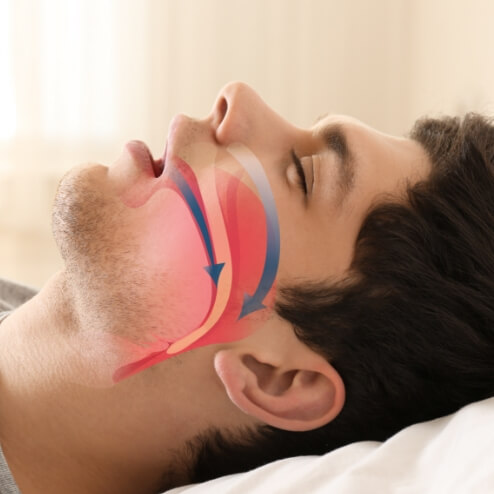
Having sleep apnea means that your breathing is repeatedly stopping and restarting while you’re asleep. Each interruption forces the body to wake up to try and get oxygen. The awakenings are short, so many people don’t even remember them.
Sleep apnea actively prevents you from getting the slumber your body needs to stay healthy. When ignored for too long, it can have life-threatening consequences, such as an increased risk of suffering from a heart attack.
Types of Sleep Apnea
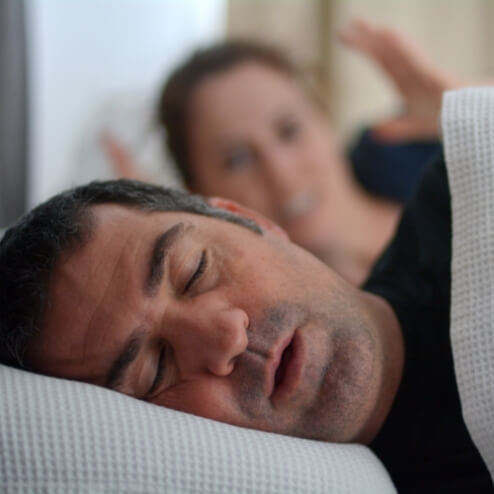
Sleep apnea consists of repeated cessations of breathing during the sleep cycle. There are three different types of sleep apnea:
- Obstructive Sleep Apnea: This occurs when the throat muscles relax and block the flow of air into the lungs.
- Central Sleep Apnea: Central sleep apnea occurs when the brain doesn’t send proper signals to the muscles that control your breathing.
- Complex Sleep Apnea: This condition occurs when you have a combination of both obstructive sleep apnea and central sleep apnea.
The Symptoms of Sleep Apnea
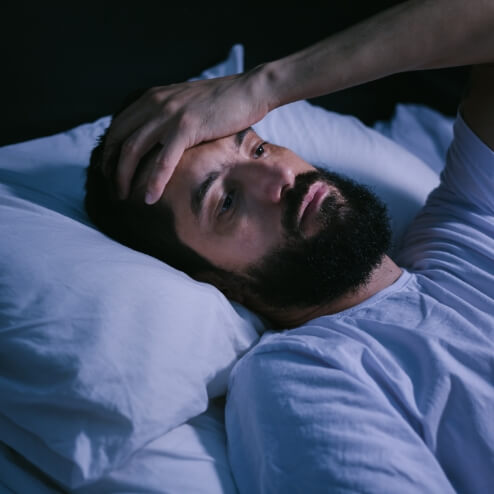
Oftentimes, symptoms for different conditions overlap, so it can be difficult to determine which signs point to sleep apnea. Here are some of the most common symptoms that sleep apnea sufferers encounter:
- Loud snoring/choking during sleep
- Frequent stoppages in breathing
- Sudden awakening with shortness of breath
- Waking up with a sore throat or dry mouth
- Difficulty staying asleep at night
- Difficulty focusing during the day
- Irritability issues and mood swings
In many cases, sleep apnea goes undiagnosed until someone else observes the warning signs. If you or your partner notice any of the symptoms listed above, you may want to consider scheduling an appointment with us to get to the bottom of the issue. We can explain how you can have a sleep test performed to determine your sleep breathing patterns, and we can put together a treatment plan that is right for you!
Understanding the Cost of Sleep Apnea Treatment

The cost of sleep apnea treatment depends on a few factors. During your consultation, we can talk about some specific numbers. We will also be happy to file insurance claims for you and help you understand other payment options. Remember, high-quality sleep is an investment that can reward you with improved health and a better quality of life! It is a truly wise use of your hard-earned money.
Does Dental Insurance Cover the Cost of Sleep Apnea Treatment?
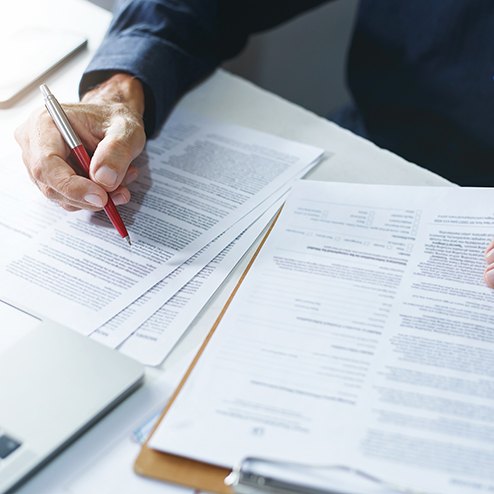
Dental insurance is meant to support the health of your teeth and gums, so you should not expect it to cover your sleep apnea treatment. Instead, you should take a look at your health insurance plan. Because sleep disorders have such a profound impact on overall wellness, treatment for them is usually at least partially covered.
Factors That Affect the Cost of Sleep Apnea Treatment
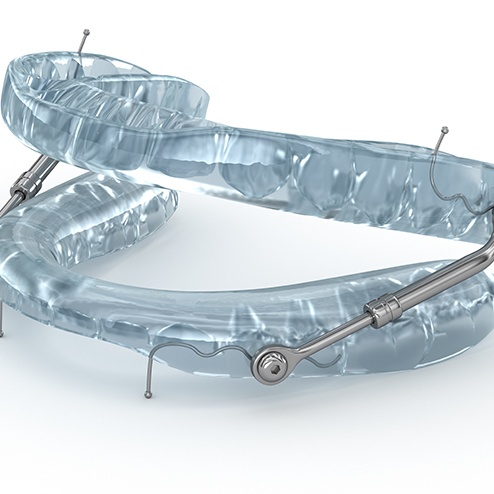
The two biggest factors that can affect the cost of your sleep apnea treatment are:
- The type of treatment you receive. CPAP and oral appliance therapy have different prices. Also, the specific oral appliance that you receive can affect cost. Generally, the long-term cost of oral appliance therapy is less than that of maintaining a CPAP device.
- Your insurance coverage. Most medical plans cover sleep testing and sleep apnea treatment. Your out-of-pocket obligation will depend on things like your deductible, your copay/coinsurance, and other factors. Also, keep in mind that some insurance plans require preauthorization before they will help pay for an oral sleep appliance. Our team will be happy to walk you through the process of using your insurance.
Treat Your Sleep Apnea Now to Improve Your Health

The upfront cost of diagnosing and treating sleep apnea might seem a little steep. However, you can rightly view such costs as an investment that will reward you greatly over time. In fact, treating your sleep apnea could actually help you financially in a few ways:
- Fewer health risks. Poor sleep is associated with a range of health conditions, including heart disease, high blood pressure, and diabetes. Treating your sleep apnea could protect your health and lower your overall medical costs.
- Lower risk of accidents. Getting better sleep may help you avoid an expensive and painful accident.
- Better performance at work. High-quality sleep can allow you to work well, which may lead to increased career opportunities.
Making Sleep Apnea Treatment More Affordable
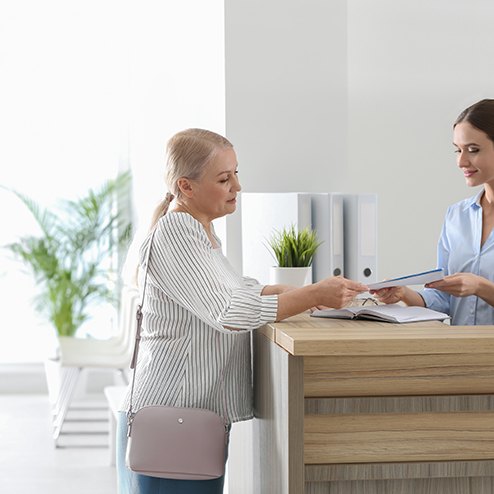
Our practice welcomes medical insurance and Medicare. We can help you figure out how your benefits apply and file claims on your behalf.
If your insurance will not assist you, or you need help to cover your copay/coinsurance, you may be eligible for third-party financing through CareCredit. The application process is fast, and most patients are readily approved for an affordable monthly payment plan.
Sleep Apnea Patient Testimonials
Sleep Apnea FAQs
Has your partner started sleeping in the guest bedroom because your snoring is keeping them up all night? You might need to consider the possibility you have sleep apnea. It is often characterized by loud snoring as well as episodes of breathing interruptions that can disrupt sleep. If you are considering treatment for sleep apnea in Plano, you may be interested in learning more about it before your appointment. On that note, our team at Sleep Rehab has compiled some frequently asked questions from past patients. If you don’t see your question below, give us a call!
What Is Obstructive Sleep Apnea (OSA)?
Obstructive sleep apnea is the most common sleep-related breathing disorder. It causes your breathing to repeatedly stop and restart while you sleep. While there are several types of sleep apnea, this is the most common, and it occurs when your throat muscles intermittently relax and block your airway during sleep.
A noticeable sign of obstructive sleep apnea is snoring. Treatment for obstructive sleep apnea often involves a device that uses positive pressure to keep your airway open while you sleep. Another treatment option is a mouthpiece that thrusts your lower jaw forward to prevent blockage of the airway. In some cases, surgery might be an option.
What Are Common Symptoms of Sleep Apnea?
The signs and symptoms of obstructive and central sleep apnea overlap, sometimes making it difficult to determine which type you have. The most common signs and symptoms of obstructive and central sleep apnea include loud snoring, episodes in which you stop breathing during sleep, gasping for air during sleep, awakening with a dry mouth, morning headaches, insomnia, excessive daytime sleepiness, difficulty paying attention while awake, and irritability.
How Is Sleep Apnea Treated?
One of the main treatment options for obstructive sleep apnea is CPAP, which stands for continuous positive airway pressure. A small CPAP machine delivers a continuous stream of pressurized air to your airways as you inhale. The pressure helps keep your airway passages open while you sleep. Because your airway remains open, pauses in breathing are prevented.
In some cases, a dental appliance may be effective in treating mild-to-moderate sleep apnea. There are two main types of dental appliances for sleep apnea including a mandibular advancement device and a tongue-retaining device. In some instances, surgery for sleep apnea may be an option if CPAP or other treatments are ineffective or not tolerated. The type of surgical procedure may vary based on a person’s anatomy and problems contributing to sleep apnea. Finally, weight loss remains an effective treatment option for overweight patients with sleep apnea, improving sleep breathing in many individuals.
What Are the Risk Factors for Sleep Apnea?
Being overweight is one of the biggest risk factors for obstructive sleep apnea. Drugs like alcohol, opiates, benzodiazepines, and other depressants can also increase your risk. Additionally, there are simple physiological differences that can increase the likelihood of developing the disorder. A congenitally narrow airway, a deviated nasal septum, and being male are all sleep apnea risk factors.
Meanwhile, central sleep apnea can occur in people that are at high altitudes. This is due to an unstable breathing response to the lower density of oxygen. The body may respond to low blood oxygen levels by hyperventilating, which can cause the person to try to slow breathing down. The mismatch between the body’s desire to breathe and the drive to not hyperventilate also leads to central sleep apnea in patients with congestive heart failure.

